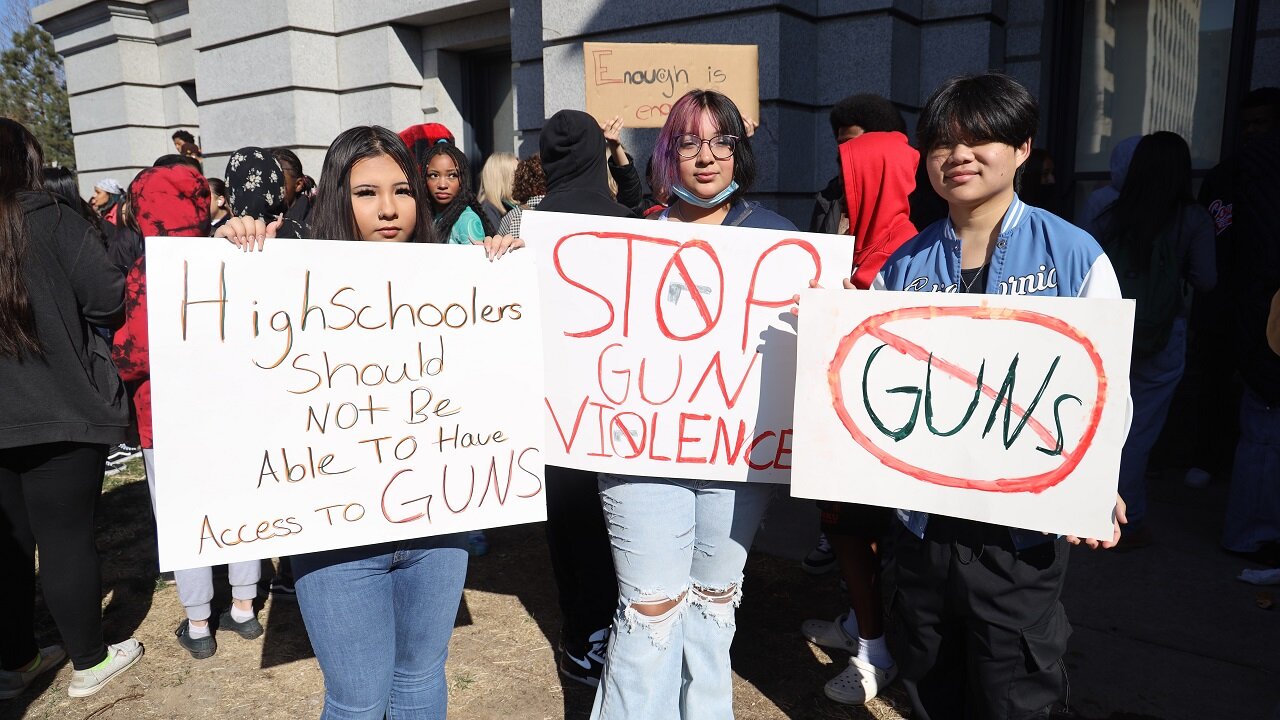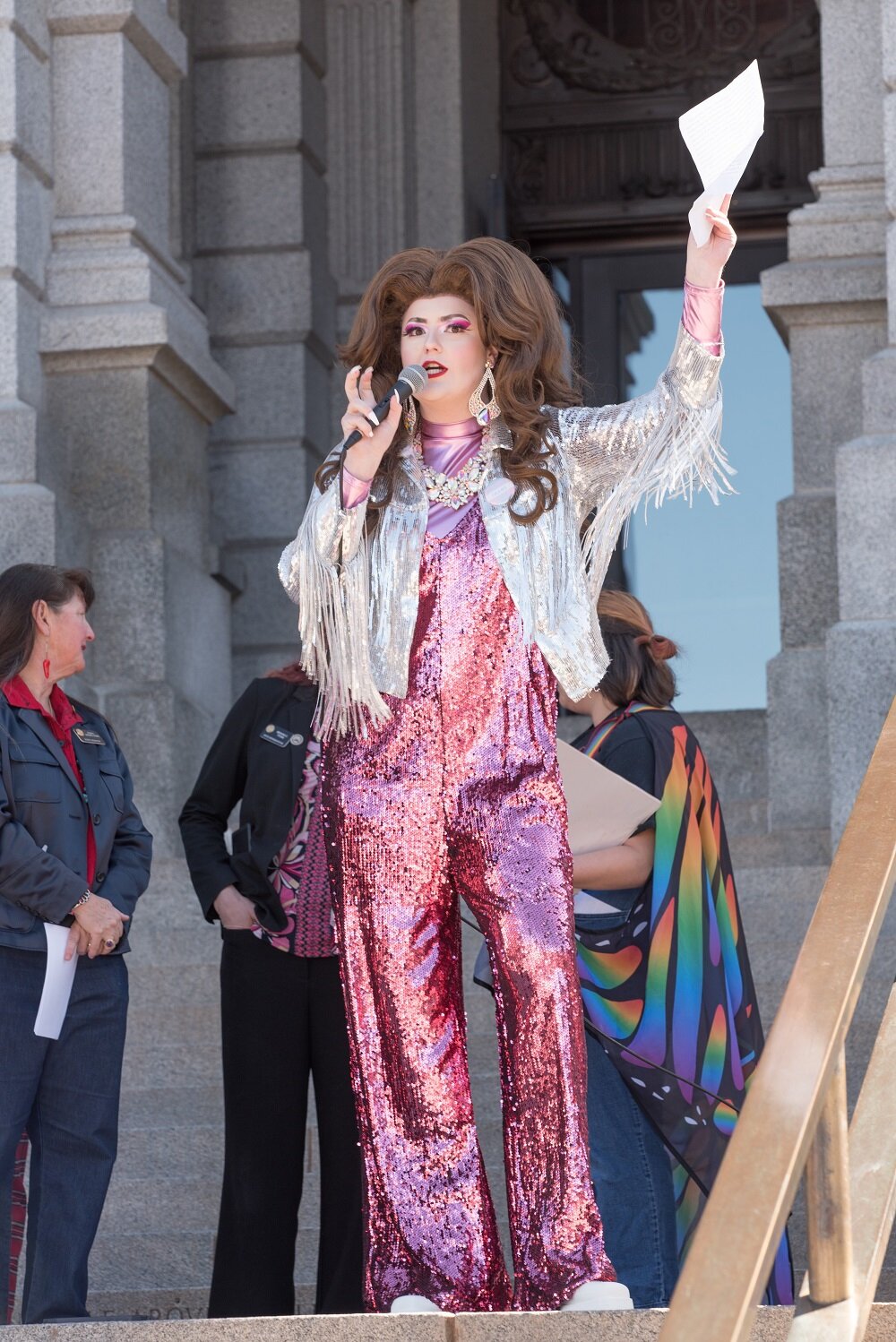Two protests, one goal: keep kids alive

DENVER — Protestors on Friday outside the Colorado State Capitol came from different backgrounds and had different priorities. But they all shared a goal: keep kids alive.
After several states floated and passed bills banning gender-affirming care and gender non-conformity for youth, Colorado LGBTQ activists planned to take the steps at the state capitol and rally around transgender youth.
“These laws are being passed that make their lives illegal,” said Tasha Ripley, co-founder of Parasol Patrol, an organization that attends LGBTQ events and shields participants from any hateful backlash. “The students here today wanted to show their peers and lawmakers and grownups that queer and trans youth have rights that need to be respected.”
Several states that have passed anti-queer legislation cited “protecting children” as their rationale for doing so. But Ripley feels those states are missing the point.
“We’re not trying to make kids gay, we’re trying to keep the gay kids alive.”
Students around Denver planned to leave school in the morning and walk to the capitol for a series of speeches from transgender advocates. Those attending planned to march down with rainbow flags and affirming signs letting lawmakers know where they stood on protecting LGBTQ rights.
Then another tragedy struck.
On Wednesday, a student at East High School allegedly shot two staff members who were patting him down for weapons. The Park County Sheriff’s Office later said they found the student’s body in the woods near his abandoned car.
The incident was all-too-familiar for the East High School community. Just last month, East students took to the capitol to protest the death of Luis Garcia, a 16-year-old student who was shot and killed in his car near the school.
“I’m here to demand action for safer schools for our students, staff members and community members,” said Madeleine St. Marie, a social studies teacher at West High School. “I’m hoping the legislators hear from their constituents today that we want more safety and we can do that by passing simple, common-sense gun legislation.”

St. Marie was among dozens of Denver Public Schools educators with the same message on Friday: teachers do not feel safe amid a plague of school shootings. Watching years go by and school shootings wrack up since the Columbine High School massacre, teachers feel their job is more dangerous now than ever.
“It’s one of those very real things teachers are encountering now is at some point, you might get shot or you might get stabbed,” said Madelyn Percy, a physics teacher at Montbello High School. “Given how easily kids are able to access guns just because they’re so ubiquitous in our communities, I feel very scared. I know for a fact that if a kid wanted to, they could kill me.”
After Wednesday’s shooting, Denver Public Schools Superintendent Alex Marrero vowed to reinstate school resource officers in schools, a move the board discontinued in 2020 over concerns about the “school-to-prison pipeline.”
But several teachers interviewed by Rocky Mountain PBS said cops in schools make them and their students feel even less safe.
“We know school resource officers tend to criminalize students of color and my high school is predominately students of color,” said St. Marie, who teaches at West. “They can’t be kids or all a sudden they’re going to worry about how it’s going to appear to this officer who’s standing in the building.”
Research also shows that officers in classrooms do not make kids and teachers safer, but do lead to more tickets and arrests, particularly for students of color, according to the National Education Association.

“It’s one of those things where when it works, it’s great, but when it doesn’t work, it’s so traumatizing for our kids,” said Percy. “I think if we’re going to reinstate school resource officers, there needs to be some really careful thought and guidelines and monitoring into who becomes an SRO, not just any patrol officer.”
Margaret Bob, a retired teacher who taught around Denver for 26 years, said she is fed up with what she sees as lawmakers siding with gun lobbyists over other citizens.
“Nothing has really changed substantially since Columbine and it makes me really frustrated that we seem to love guns more than kids, that the gun lobby seems to control everything and that capitalism rises above humanity,” Bob said. “We have to love kids more than we love guns.”
Many who spoke out against gun violence also stayed at the capitol to rally support for LGBTQ kids, who are at greater risk of depression and suicide than their peers.
“As a queer person in high school, I worry about my life every day,” said Ophelia Peaches, an 18-year-old drag queen from Aurora. “I think I should be more worried about my grades than if my school is going to go into a lockdown.”
As a visibly queer teenager, Peaches said she often felt unsafe attending school. If a shooter struck, Peaches knew she would be an easy target. She wishes she’d never had to assess that risk.
“The queer community is tired of being marginalized,” Peaches said. “When I think about these anti-trans and anti-drag bills, it’s ignorant, it’s bigotry.”
Alison Berg is a multimedia journalist at Rocky Mountain PBS. You can reach her at alisonberg@rmpbs.org.
William Peterson is a senior photojournalist at Rocky Mountain PBS. You can reach him at williampeterson@rmpbs.org.